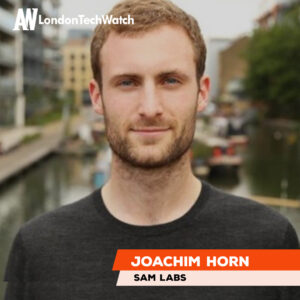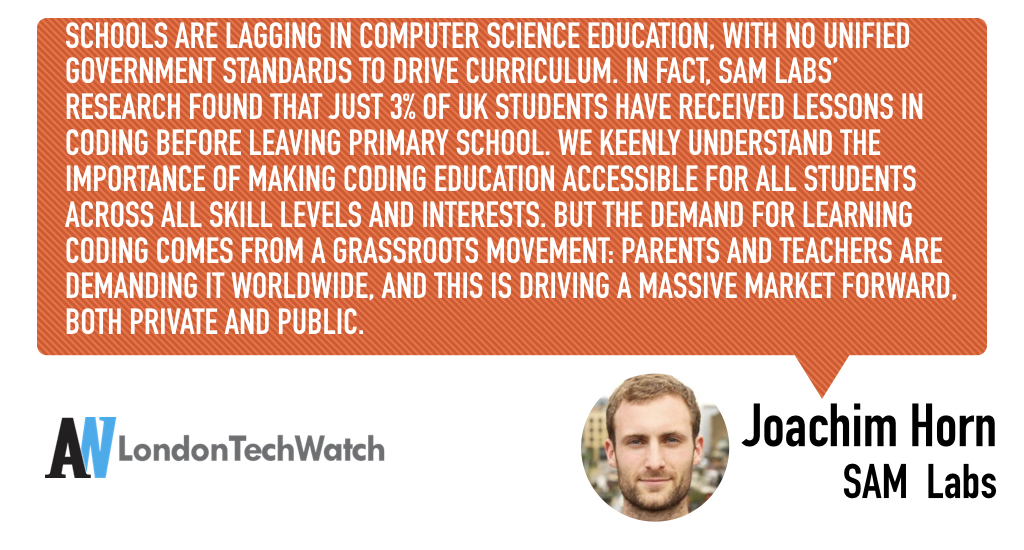Children have a wealth of creativity within them waiting to be unleashed. Traditional education curriculums may not engage youth to discover the world of creativity and the world of coding. SAM Labs, is shaking up the edtech space by empowering teachers with an actionable and engaging set of tools through their award-winning technology kits and educational apps to deliver fun and engaging content to their students. The components in the kits can be as described as modularized IoT-enabled Legos. Combing both fun and learning, SAM Labs ensures that computer science will be taught future generation in a scaleable and effective way.
London TechWatch chatted with CEO Joachim Horn about the company and their most recent round of funding.
Who were your investors and how much did you raise?
SAM Labs raised a £5.1 million ($6.75 million) Series A round of financing led by Touchstone Innovations and E15 Ventures.
Tell us about your product or service.
SAM Labs is an edtech company that empowers teachers and students with the most engaging STEAM solutions – including lesson plans, apps, and electronics. At SAM Labs, our goal is to inspire every student to discover the fun in coding and creating. With a focus on building products that capture all students’ imaginations, we’re democratising the edtech industry. By combining highly engaging software with intuitive, user-friendly wireless electronic blocks, SAM Labs teaches coding and engineering to children of all skill sets and interests.
SAM Labs offers both a deep-dive in the coding curriculum to create and cement computing knowledge, before applying it to projects across a variety of subjects — from biology, to probability, to music — we build edtech products for both the athlete and the artist. We also offer a solution for teachers by providing in-classroom support for both the early adopter and the tech-hesitant teacher – offering fully integrated and curriculum-based lesson plans and hands-on educator support.
 What inspired you to start the company?
What inspired you to start the company?
After graduating from Imperial College London, I helped to bring design into the engineering department at the Tokyo Institute of Technology. That design track still exists today with partnerships spanning from London, to Paris, Tokyo, and the USA. That experience inspired me to try to apply design beyond the university setting. Once back in London, I founded SAM Labs to make electronics simple enough for anyone to be creative with them or use in an educational way. I wanted to remove all entry barriers.
How is it different?
At SAM Labs, we developed a product that engages students with totally varied interests. It is democratising edtech by making coding for everyone. While many edtech toys only focus on one output – fun or learning – SAM Labs integrates both at the core of each product because we know that it’s critical to capture the imagination of a student in order for them to be engaged in the classroom. Our products add true value to teachers and students, as it directly tied to the curriculum and developed by education experts. Furthermore, it bridges the gap between early adopters and users who are more hesitant with technology.
The majority of today’s teachers did not learn coding as part of their elementary education; however, most do understand the value in children learning computer science. We create the opportunity to make this learning possible. In fact, our recent research shows that 49% of UK adults believe that all kids should be taught at least some mandatory basic coding before they leave school and 1 in 3 believe that most jobs of the future will depend on coding.
What market are you targeting and how big is it?
SAM Labs is targeting the education technology market and is focused on teachers and schools looking for educational tech products for their classrooms.
The global edtech market is set to reach $252 billion by 2020. In the first six months of 2017, edtech companies in the U.S. alone received more than $887 million in venture funding. However, at the same time in edtech, crowdfunding equity surpassed that of venture capital funding for the first time in 2016. This has enabled more novel edtech ideas to come to life because their existence isn’t dependent on just a few investors.
What’s your business model?
SAM Labs sells edtech products as kits directly to teachers and school districts. We also offer easily accessible, free teaching materials on our website that provide resources and support with both information on the products and general coding and computer science basics. In addition, we work with our distributors to provide free training for teachers to ensure they’re fully confident with the projects and lessons SAM Labs offers.
What are some challenges in building and scaling an edtech company?
Through my experiences building and scaling SAM Labs, I’ve found three main challenges in the edtech space:
- Delivering the perfect balance of innovation and infrastructure readiness is a challenge. We strive to make teachers’ daily tasks more impactful and help them with the right technology, while not alienating them with brand-new, incomprehensible gadgets.
To ensure we don’t focus on ‘innovation for innovation’s sake’ we test our ideas and products daily with our teacher and student network. We are focused on making them smarter, not on them realising how smart we are.
- Keeping all levels of our organisation present “on-the-ground” with teachers as much as possible, while also continuing to have time to implement the solutions. We therefore assign a specific amount of time that anyone at SAM must spend with education entities.
- Reaching the target audience proves a challenge in itself because although there is a lot of strength in education, it stems from the independence of schools. There isn’t just one channel to reach everyone, so at SAM Labs we focus largely on contagious word-of-mouth.
What was the funding process like?
It’s of course challenging and requires a lot of endurance. But there are beneficial aspects as well: the amazing part of fundraising is the level of granularity that it pushes you to go through from the ‘vision’ to the actual implementation. Funds wanted to know about the “nitty-gritty” of our vision and see clearly stated assumptions. This made us dive even deeper into our assumptions and perform further research. We took this as an opportunity to learn more and improve.

What factors about your business led your investors to write the check?
Schools are lagging in computer science education, with no unified government standards to drive curriculum. In fact, SAM Labs’ research found that just 3% of UK students have received lessons in coding before leaving primary school. We keenly understand the importance of making coding education accessible for all students across all skill levels and interests. But the demand for learning coding comes from a grassroots movement: parents and teachers are demanding it worldwide, and this is driving a massive market forward, both private and public. We’re proud to invest in tomorrow’s coding experts, and these investors share our sentiment.
What are the milestones you plan to achieve in the next six months?
In the next six months, we will be releasing new education products to join our already existing product line that includes the STEAM Kit, Inventor Kit and Curious Cars. The new products are launching next yearand were developed with teachers top of mind. They will all be priced very affordably for schools and their usability is specifically tailored for classroom use. We are a product-led company and with our focus on teacher support, these products will help carry out our mission to bring coding and creation to every student.
Where do you see the company going now over the near term?
In the near term, we are focusing on working closely with teachers to create the best products that add value for them. Tech training is necessary for teachers to effectively use these products and tools in class. We understand how important technology education is to the future of work and children’s early education, so starting with teachers is a no-brainer. The investment here doesn’t need to start with a two-week boot camp: a 45-minute hands on session, an interactive webinar, or direct access to FAQs is very effective when it comes to beginning to invest in STEM training for teachers.




